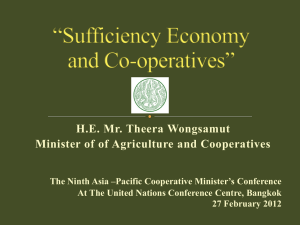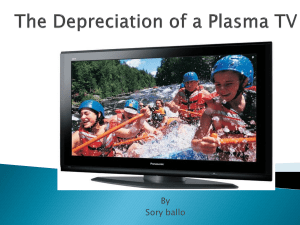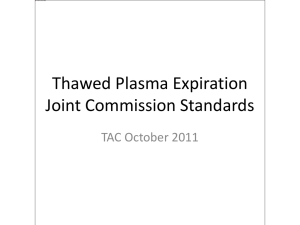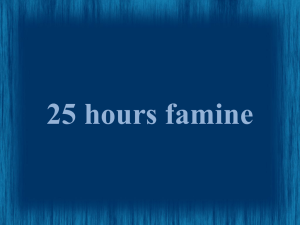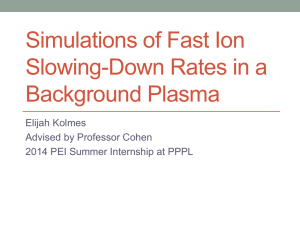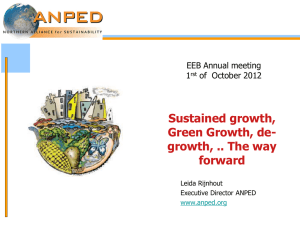La fin du
advertisement
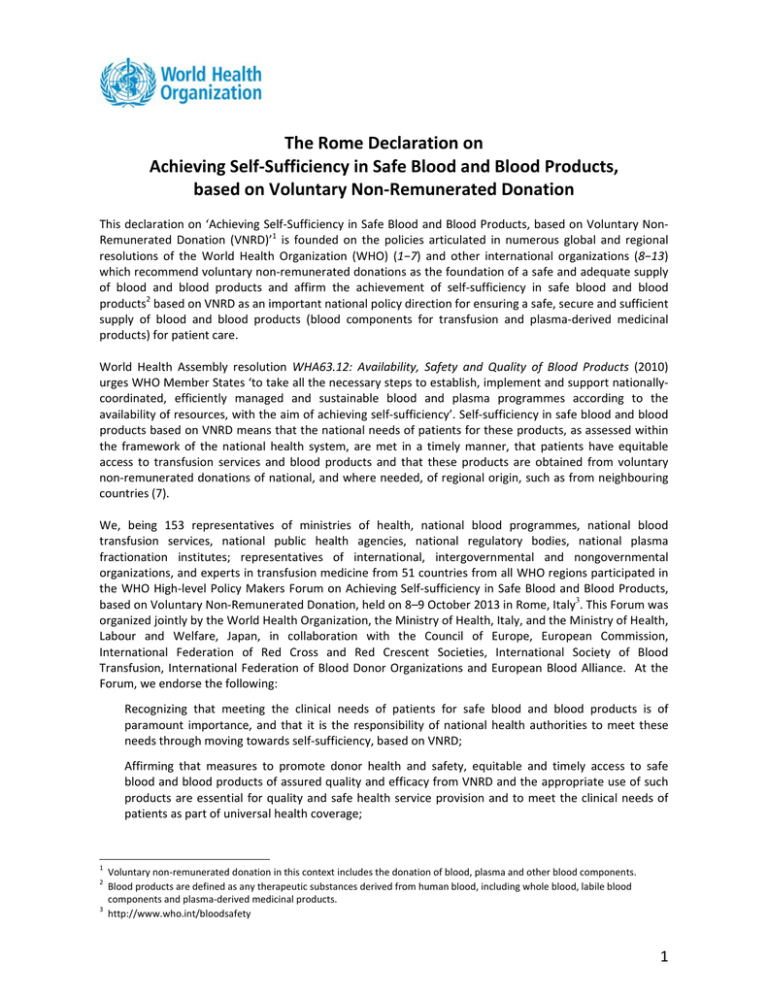
The Rome Declaration on Achieving Self‐Sufficiency in Safe Blood and Blood Products, based on Voluntary Non‐Remunerated Donation This declaration on ‘Achieving Self‐Sufficiency in Safe Blood and Blood Products, based on Voluntary Non‐ Remunerated Donation (VNRD)’1 is founded on the policies articulated in numerous global and regional resolutions of the World Health Organization (WHO) (1−7) and other international organizations (8−13) which recommend voluntary non‐remunerated donations as the foundation of a safe and adequate supply of blood and blood products and affirm the achievement of self‐sufficiency in safe blood and blood products2 based on VNRD as an important national policy direction for ensuring a safe, secure and sufficient supply of blood and blood products (blood components for transfusion and plasma‐derived medicinal products) for patient care. World Health Assembly resolution WHA63.12: Availability, Safety and Quality of Blood Products (2010) urges WHO Member States ‘to take all the necessary steps to establish, implement and support nationally‐ coordinated, efficiently managed and sustainable blood and plasma programmes according to the availability of resources, with the aim of achieving self‐sufficiency’. Self‐sufficiency in safe blood and blood products based on VNRD means that the national needs of patients for these products, as assessed within the framework of the national health system, are met in a timely manner, that patients have equitable access to transfusion services and blood products and that these products are obtained from voluntary non‐remunerated donations of national, and where needed, of regional origin, such as from neighbouring countries (7). We, being 153 representatives of ministries of health, national blood programmes, national blood transfusion services, national public health agencies, national regulatory bodies, national plasma fractionation institutes; representatives of international, intergovernmental and nongovernmental organizations, and experts in transfusion medicine from 51 countries from all WHO regions participated in the WHO High‐level Policy Makers Forum on Achieving Self‐sufficiency in Safe Blood and Blood Products, based on Voluntary Non‐Remunerated Donation, held on 8–9 October 2013 in Rome, Italy3. This Forum was organized jointly by the World Health Organization, the Ministry of Health, Italy, and the Ministry of Health, Labour and Welfare, Japan, in collaboration with the Council of Europe, European Commission, International Federation of Red Cross and Red Crescent Societies, International Society of Blood Transfusion, International Federation of Blood Donor Organizations and European Blood Alliance. At the Forum, we endorse the following: Recognizing that meeting the clinical needs of patients for safe blood and blood products is of paramount importance, and that it is the responsibility of national health authorities to meet these needs through moving towards self‐sufficiency, based on VNRD; Affirming that measures to promote donor health and safety, equitable and timely access to safe blood and blood products of assured quality and efficacy from VNRD and the appropriate use of such products are essential for quality and safe health service provision and to meet the clinical needs of patients as part of universal health coverage; 1 2 Voluntary non‐remunerated donation in this context includes the donation of blood, plasma and other blood components. Blood products are defined as any therapeutic substances derived from human blood, including whole blood, labile blood components and plasma‐derived medicinal products. 3 http://www.who.int/bloodsafety 1 Acknowledging that many countries face major challenges in making sufficient supplies of blood and blood products available, accessible and sustainable, while also ensuring the quality and safety of these products in the face of known and emerging threats to public health; Recognizing that the commitment and support of national governments in developing and implementing policies for the achievement of self‐sufficiency in safe blood and blood products based on VNRD, are prerequisites for well‐organized, coordinated and sustainable national blood and plasma programmes that can ensure universal and timely access to safe blood and blood products; Acknowledging that the achievement of self‐sufficiency in safe blood and blood products based on VNRD requires a long‐term perspective; this should be aligned to the state of development of the national health system and generally follows a step‐wise development in scope, from whole blood to blood components for transfusion and further towards plasma fractionation for the provision of plasma‐derived medicinal products (PDMP); Recognizing that globally the most robust and safe national blood systems with sustainable access to sufficient supplies are based on the principle of VNRD; and that the continuity, sufficiency, sustainability and security of national supplies of safe blood and blood products require an adequate number of regular, voluntary, non‐remunerated donors of blood and blood components; Concerned that many countries currently depend to varying degrees on family/replacement donations (which have the potential for hidden payments) and also on paid donation; Recognizing that payment for the donation of blood, plasma and other blood components not only threatens safety but also contravenes the Council of Europe’s Oviedo Convention on Human Rights and Biomedicine of 1997 (13) which explicitly prohibits any financial gain from the human body and its parts, which erodes community solidarity and social cohesion that can be enhanced by the act of voluntary non‐remunerated donation; Committed to the health and safety of donors and concerned that payment for the donation of blood, plasma and other blood components may exploit the poor and vulnerable by providing them with financial incentives to donate and that voluntary non‐remunerated blood donor programmes may be compromised or undermined by the presence of parallel systems of paid donation; Recognizing that, in the long term, it will not be feasible for a small number of countries to collect sufficient plasma to produce enough plasma‐derived medicinal products to meet global needs; Concerned that fragmented and poorly coordinated blood systems and services hinder efforts to ensure the accessibility and sufficiency of blood supplies and also contribute to the wastage of blood and blood products; Aware that large volumes of plasma recovered from whole‐blood donations based on VNRD, mainly in low‐ and middle‐income countries, are currently discarded because of concerns that quality, logistical and budgetary requirements are not being met for plasma for fractionation for the manufacture of PDMP. We declare that we: Reaffirm self‐sufficiency in safe blood and blood products based on VNRD as the policy direction to provide equitable access to safe blood and blood products to meet the clinical needs of patients as part of universal health coverage; Recognize the strategic value of formulating and implementing national blood policies and legislation consistent with WHO resolutions and recommendations, and developing effective and sustainable national blood and plasma programmes to meet patients’ needs for blood and blood products; Commit to working towards the donation of blood, plasma and other blood components, in line with other therapeutic substances of human origin, only from VNRD, as appropriate in the national context, and ensuring that donations should remain in the public domain; 2 Commit to supporting, developing and implementing strategies for the stepwise progression from whole blood to blood components and PDMP consistent with the development of national health systems; and ensuring that recovered plasma can also be used for fractionation, thereby fully utilizing every donation; Support the implementation of strategies for good clinical transfusion practices, including the appropriate use of blood and blood products, patient blood management, safe administration of blood and blood products, and haemovigilance; Pledge to work in collaboration in international and regional efforts to promote self‐sufficiency in safe blood and blood products, based on VNRD; Pledge to promote and contribute to the establishment of global mechanisms for governance and monitoring to ensure transparency and accountability for the provision and use of blood and blood products at national and international levels. We call on relevant national authorities to: Incorporate the goal of self‐sufficiency in safe blood and blood products, based on VNRD, into national health policies and to implement strategies to achieve this goal; Introduce legislation to prohibit payment in cash or in kind for the donation of blood, plasma and other blood components and also, with specific timelines, to ensure VNRD as the source of labile blood components and PDMP as a means of moving towards self‐sufficiency in safe blood and blood products; Introduce labelling requirements to distinguish blood and blood products from PDMP of VNRD origin vs. paid donations, as well as the country of origin, to enable hospitals, clinicians and patients to make informed choices about the source of the products that they utilize; Provide sufficient financial and other resources to move towards self‐sufficiency, based on VNRD; Establish a mechanism for the national coordination of the blood system, with the integration of blood and plasma programmes aimed at optimizing the use of recovered plasma for fractionation and minimizing wastage; Put in place mechanisms and formal agreements between the blood system and fractionator(s) for the fractionation of surplus recovered plasma from VNRD to avoid the discard of recovered plasma and to contribute to national or regional self‐sufficiency; Incorporate measures to achieve self‐sufficiency into the regulatory framework; to facilitate the supply of plasma, intermediate products and PDMP sourced from VNRD within regional or other collaborative self‐sufficiency arrangements, including contract fractionation; and to phase out in a programmed manner, the use of blood components for transfusion, intermediates and PDMP obtained from paid or compensated donors and family/replacement donors; Introduce specific measures, consistent with relevant international trade agreements, to protect the health of the public by ensuring the provision of sufficient, safe blood and blood products in the national health system through nationally, or where needed, regionally sourced VNRD (such as from neighbouring countries); Establish mechanisms, such as an independent national transfusion committee, to identify actual clinical needs, to monitor trends in demand, patient needs and the clinical use of blood and blood products, to regularly evaluate and report on the level of sufficiency and to advise on priorities in the national supply; Introduce strategies and measures to establish appropriate quality systems and standardized procedures in the national blood system for the collection, testing, processing, storage, distribution and use of blood and blood products; 3 Establish or strengthen existing mechanisms to collect, monitor and ensure the accuracy, transparency and traceability of all data on blood and blood product safety and reports from blood transfusion services and manufacturers of PDMP on national distributions, imports and exports of blood products and related intermediates, including the contribution of donations derived from VNRD; Share key reports on blood and blood product safety and supply internationally to enable countries to make informed policy decisions for the safety and sufficiency of the supply of blood and blood products. Note: This Declaration is an outcome of the WHO High‐level Policy Makers Forum on Achieving Self‐ Sufficiency in Safe Blood and Blood Products, based on Voluntary Non‐Remunerated Donation, October 2013, Rome, Italy. It does not necessarily represent the decisions or policies of all governments and organizations represented, including the Australian Department of Health, and the Ministry of Health, Welfare and Sport, The Netherlands. References 1 World Health Assembly resolution WHA63.12. Availability, safety and quality of blood products. Geneva, World Health Organization, 2010. http://apps.who.int/gb/ebwha/pdf_files/WHA63/A63_R12‐en.pdf 2 World Health Assembly resolution WHA58.13. Proposal for establishment of World Blood Donor Day. Geneva, World Health Organization, 2005. http://www.who.int/bloodsafety/WHA58_13‐en.pdf 3 World Health Assembly resolution WHA28.72. Utilization and supply of human blood and blood products. Geneva, World Health Organization, 1975. http://www.who.int/entity/bloodsafety/en/WHA28.72.pdf 4 Resolutions related to blood safety adopted by WHO governing bodies. Geneva, World Health Organization, 2010. http://www.who.int/entity/bloodsafety/BTS_ResolutionsAdopted.pdf 5 WHO global consultation on 100% voluntary non‐remunerated blood donation of blood and blood components. Geneva, World Health Organization, 2009. http://www.who.int/bloodsafety/events/consultation_vnrbd/en/index.html 6 The Melbourne Declaration on 100% voluntary non‐remunerated donation of blood and blood components. Geneva, World Health Organization, 2009. http://www.who.int/entity/worldblooddonorday/Melbourne_Declaration_VNRBD_2009.pdf 7 Expert consensus statement on achieving self‐sufficiency in safe blood and blood products, based on voluntary non‐ remunerated blood donation (VNRBD). Geneva, World Health Organization, 2012. http://www.who.int/bloodsafety/Expert_Consensus_Statement_Self‐Sufficiency.pdf 8 Guide to the preparation, use and quality assurance of blood components, 17th edition. Strasbourg, Council of Europe, 2013. http://www.edqm.eu/site/General_Information_on_the_Blood_Guide_EnglishFrenpdf‐en‐30591‐2.html 9 Position paper. Promoting safe and sustainable blood systems. Geneva, International Federation of Red Cross and Red Crescent Societies, 2011. http://www.ifrc.org/en/what‐we‐do/health/blood‐services/position‐paper‐promoting‐safe‐and‐sustainable‐blood‐ systems/ 10 A Code of Ethics for blood donation and transfusion. Amsterdam, International Society of Blood Transfusion, 2006. http://www.isbtweb.org/about‐isbt/code‐of‐ethics/ 11 Blood, tissues and cells from human origin. Amsterdam, European Blood Alliance, 2013. http://issuu.com/ebloodalliance/docs/blood_tissues_and_cells_from_human_origin 12 Position paper. Voluntary non‐remunerated donations. Amsterdam, European Blood Alliance, 2009. http://ebaweb.files.wordpress.com/2012/08/eba‐position‐paper‐on‐non‐remunerated‐donors‐20091002.pdf 13 Convention for the protection of human rights and dignity of the human being with regard to the application of biology and medicine: convention on human rights and biomedicine, Oviedo, 4.IV.1997. Strasbourg, Council of Europe, 1997. http://conventions.coe.int/Treaty/en/Treaties/Html/164.htm 4

